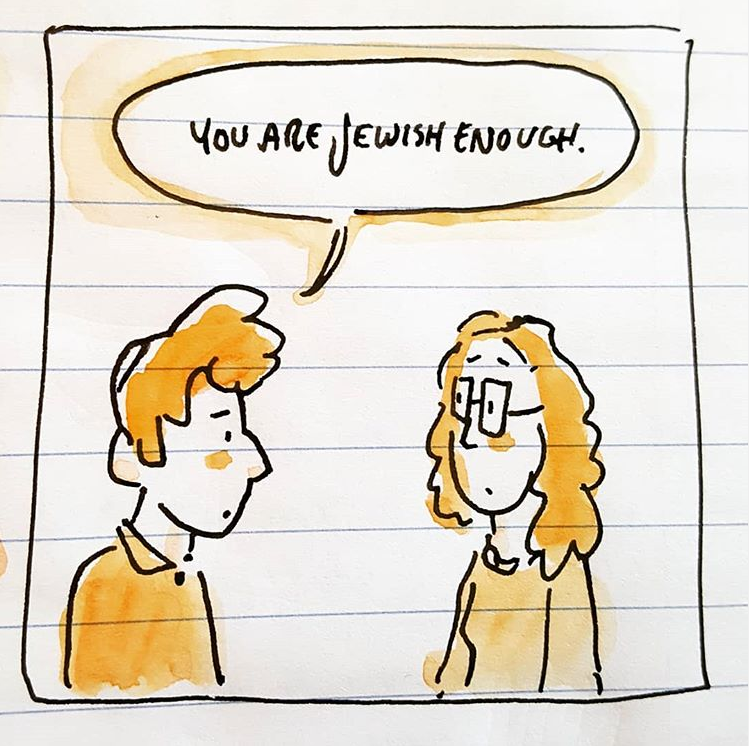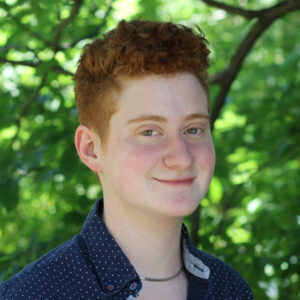When I began my placement at New Voices and Judaism Unbound, I wasn’t entirely sure what the year would entail. I knew I’d be working to support a podcast I’d loved from a distance for many years. I knew I’d be in a cohort with a few other Jewish students, woven together by Skype calls and eventually, a conference in New York. What I didn’t know was how these relationships would flourish into deep bonds, becoming a community that acted as a source of support and dialogue during some of the year’s darkest moments.
During my interview, I remember being asked the question, “If you’re selected for this fellowship, how would you measure success at the end of it?”
I have always felt that success is best measured not in achievements or productivity (though these are certainly good and worthy outcomes), but rather by the quality of relationships made with those around me. It was a gift to get to work with Lex Rofeberg as my supervisor, sharing d’vrei Torah during our weekly check-ins, and learning both about the art of podcasting and the wide variety of Jewish topics explored by guests on the show.
Equally as meaningful were the friendships I made with the other fellows, a constant group chat which became not only a space of friendly energy, but a site of discussion about all things Jewish and political. In the weeks after the Poway shooting and in the wake of a year filled with antisemitic attacks, the tight community of fellows became a constant and reliable place of safe Jewish discourse. We challenged and comforted each other in equal measure. Though I am lucky to be part of many Jewish communities of a variety of shapes and colors, this particular group has felt close to my heart, unique to have the chance to share celebration and grief with other Jewish artists also seeking truth, self, and belonging.
It was particularly special to have the experience of working with Daniel Holtzman, the editor of New Voices and the fellowship’s facilitator. Not only was Daniel an instrumental and deeply supportive role model, encouraging fellows to create and share, but they also became a unique mentor during a year that was personally significant for both of us. Both Daniel and I began medically transitioning over the course of 2019, voices dropping in tandem with each Zoom call. Not only was it deeply meaningful to have a mentor transitioning alongside me, but it was even more remarkable to watch them model the life of a writer and an activist during this moment of change.
Daniel has published several pieces writing openly about the intersections of their politics, Judaism, and gender, courageous to share the personal dimensions of their own life with New Voices Magazine. I will never forget being in Elizabeth, New Jersey this summer for the very first Never Again protest, where a crowd of Jews effectively shut down a detention center for several hours. Afraid of what cops do to trans people, I myself decided not to risk arrest. It was humbling, then, to see Daniel standing arm-in-arm in front of the center’s gate, one of the 36 protesters brought to jail. In moments of great darkness, facing the realities of American concentration camps and human rights abuses, I most feel that the world is a narrow bridge. But watching this demonstration, I saw a true example of what it means to not be afraid. I strongly believe we cannot separate the personal from the political, and I will forever be touched to have a mentor who lives by this so honestly.
Over the course of the fellowship, I think my understanding of Jewish media has deepened and grown more full, learning through the placements of the other fellows and through my own experience at the podcast about how truly independent many Jewish media outlets are. I feel proud to be connected to a people whose past (and present) is so rich with independent publishing – and unapologetically personal and political. As a zine-maker and comics artist, this is a legacy I’m proud to inherit.
Within Judaism Unbound specifically, I am so grateful to have had the chance to learn from Dan Libenson and be closely mentored by Lex Rofeberg over the course of this past year. They value discourse on the show, and this translates to how they treat each other and have engaged with me, encouraging disagreement and dialogue as we worked together on the project of the podcast.
Over the course of this year, I finished my final two semesters of college and am now a graduate, deciding my next steps. For me, a major part of the transition between school and the world beyond it is reorienting myself to Jewish community. For the last few years, campus Jewish life has been an important and sustaining force. The UW Chabad has been a touchstone for me, with a dedicated and small community of Jewish from diverse backgrounds and practices. When I leave Madison, I’ll have to do the work again of finding a resonant Jewish community – and as a queer, non-binary, leftist Modern Orthodox(ish) Jew, I have a lot to consider. But the kinds of Jews I’ve met this year through this fellowship has expanded my horizons and knowledge of the potential types of communities I could join or even create.
If anything, this year has taught me that young Jews are hungering for community that is both politically courageous and religiously rooted. I remember at the New Voices Jewish Student Journalism Conference, we began with an activity where each participant asked a question of the circle. If it was true for you, you’d step forward (or raise your hand). Then after everyone had made their choice, the circle reset. I remember asking, “Are you curious about Jewish observance?” To my complete surprise, everyone stepped forward and raised their hands.
Beyond the projects I worked on (including a resource zine for Shavuot and a one-shot podcast episode on the topic of “Pluralism of Necessity”), one of the biggest takeaways from this fellowship has been the realization that political engagement and religious identity can and must go hand in hand. For thousands of years, Jews have shaped our understandings from the wisdom within our tradition, using Torah to inform ideas of justice and action which we bring into the world around us. Many young Jews, especially those with progressive politics, often feel alienated by religious communities, assuming observance corresponds with conservatism.
But we all receive the Torah regardless of our political stances, and part of the joy of being Jewish is that we are bound by the same sacred text. That unbreakable bond, that ahavat yisrael, is what gives us the power to liberate ourselves and each other. We are very much in the wilderness, traveling together through the desert. This fellowship has revealed to me how much all Jews need Torah – and how much the Torah needs all Jews, especially those who feel most at the edges of the camp. There is a saying, “klal yisrael arevim zeh la zeh,” meaning, “All of the Jewish community is responsible for one another.” Nowhere does this feel truer than the hearts of my friends and comrades struggling to heal themselves and others within a broken, corrupt nation while wrestling with their own Jewish identities, their own angels.
I am so grateful for all of the opportunities and relationships I’ve been given this year. I’ll cherish these lessons always and will carry them with me in my writing, my art, and my activism, always, as a Jew.

